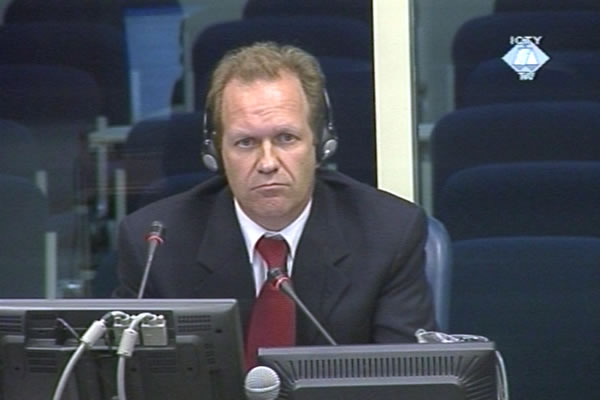Home
WHO BURNED HOUSES ‘MORE PROFESSIONALLY’?
In his testimony at the trial of generals Gotovina, Cermak and Markac, Soren Liborius, former member of the EU monitoring mission in Krajina, contends that in August 1995 Crotian forces burned and destroyed Serb property ‘far more professionally’ than the Serb troops did when they targeted Croat houses in Krajina in 1991
 Soren Liborius, witness in the Gotovina case
Soren Liborius, witness in the Gotovina case Former member of the EC monitoring mission Soren Liborius came to Knin in late July 1995 and remained there until late November 19995. He gave five statements to the OTP investigators from 1995 to 2008, describing the systematic and 'professional' destruction of abandoned Serb property and presented his conclusions regarding the reasons behind the campaign. The prosecutor tendered these statements into evidence today together with dozens of reports by the EC monitors about the situation in Krajina. Many of the documents were signed by Liborius.
During the first two weeks after Operation Storm, the campaign of destruction and burning of Serb property was particularly well organized. Croatian soldiers and police were primary perpetrators; this lead Liborius to conclude that the campaign was implemented on the orders issued by higher authorities in order to ‘destroy the material basis’ for the return of the Serbs who had fled the area. As the time went by, civilians also joined the campaign. According to the witness, this indicates that revenge was becoming the key factor in the campaign. Liborius estimated that the one-month campaign resulted in the partial or total destruction of 60 to 70 percent of abandoned Serb houses.
When he and other observers wanted to enter the villages where there was looting and arson, Liborius recounted, they were not allowed under various pretexts; the first and foremost was 'security reasons'. At the same time, the witness said, civilians could enter the villages easily and proceeded to loot the houses and take the stolen items; the police and troops never stopped them. When he asked why the 'security reasons' prevented the monitors from entering the villages, while the civilians could go in, he would get no answer; in most cases, the personnel manning the checkpoints would 'just laugh' at his questions.
General Ivan Cermak was the only person who could help them to go through the blockade at the checkpoints. In his evidence today, Liborius called Cermak the 'commander of the Knin military district'. Just one phone call to Cermak was enough to make the civilian or military police at the check point change their minds and allow the monitors to pass.
Describing the situation in a number of villages near Knin, Liborius said that although the houses were destroyed, the churches remained intact. In the weeks to come after Operation Storm, Orthodox places of worship were guarded by the Croatian army. Croatian soldiers told Liborius that they were there under General Gotovina's orders. Although this part of Liborius' testimony might play into the hand of the accused general, it also incriminates him because Liborius said that the soldiers guarding the churches observed the burning of the nearby houses or were themselves involved in it.
Moreover, the evidence of the former EC monitor is contrary to Gotovina's defense argument that units under Gotovina's command left Krajina immediately after Operation Storm and headed into BH.
Soren Liborius continues his testimony tomorrow.
Linked Reports
- Case : Gotovina et al. - "Operation Storm"
- 2008-09-08 DEAD UNDER POLICE PROTECTION
- 2008-09-05 DAY OR NIGHT, ON SUPERIOR’S ORDERS
- 2008-09-04 FABRICATED REPORTS AT CROATIAN SPECIAL POLICE TOP
- 2008-09-11 SPEECHLESS TALKS WITH GENERAL GOTOVINA
- 2008-09-11 GOTOVINA'S DEFENSE: 'IT WAS ANARCHY'
- 2008-09-12 WHY REPORT CRIMES TO THOSE WHO COMMITTED THEM?
